Mona Awad’s Rouge: A Scream Into the Void of Mirrors
words on beauty culture, Mona Awad’s latest horror, and the fine line between self-care and self-surveillance
Welcome to my first ever Substack post! I hope you enjoy my words on beauty culture, Mona Awad’s Rouge, and the fine line between self-care and self-surveillance.
I started reading Rouge while I was waiting for my retinoid to sink in. The irony was not lost on me. I recognised the absurdity of engaging with a novel that critiques the obsessive pursuit of beauty and perfection while actively participating in it. What is the merit in acknowledging something like this if I don’t actually desire to change my behaviour? The retinoid makes me glow, right? I continued reading and became increasingly alarmed as my red light therapy mask undoubtedly turned the shade of rouge.
Mona Awad’s Rouge is a gothic fever dream and a saturated satire of beauty culture. An eerily relevant tale of devotion to skincare, our protagonist Belle stumbles upon something sinister and cult-like after her mother’s suspicious death. She’s gone the way of the roses. What this means, exactly, is deliberately drip-fed to us throughout the narrative’s winding progression.
The bleeding heart of the novel is Belle’s complex relationship with Noelle, AKA Mother. Noelle is a mother whose love is conditional, transactional, and inexorably entangled with aesthetics. Belle has spent her life both chasing and rejecting her mother’s ideals—beauty as power, as currency, as something to be relentlessly perfected. Awad paints their dynamic with a subtle suffocating tension: a mother whose love and intrinsic value is stocked into her appearance, alongside a daughter caught between longing for approval and fearing what her future may look like coming of age within this appearance-obsessed society.
I want this piece to be spoiler-free but the last 70 pages made me cry like a baby. I have never seen such a tender depiction of mother-daughter reconciliation. You can read my full review of Rouge on GoodReads!
Mother is a spectral presence in Belle’s life long before her untimely death. Punctuated in italics throughout Belle’s narration, Noelle’s influence lingers in the liminality of every insecurity (absorbed or otherwise) and within every beauty product she reaches for out of habit. This tension Awad creates between unfiltered organic thoughts and those superimposed on us through external sources illuminates the chokehold beauty culture has on the subconscious. It worms into our internal monologues until we can no longer tell where our own thoughts end and inflicted expectations begin.
As I read about Belle falling deeper into a world of products and rituals promising physical and emotional transcendence, I couldn’t help but recognise myself. Not so much in the horror elements of the novel, but perhaps a more terrifying revelation. I recognised myself in the quiet, everyday absurdity of it all. The six-step skincare routine. The compulsive ingredient-checking. The belief that perfection is, in fact, attainable, and it is sealed within an overpriced moisturiser.
Belle is the ideal protagonist for Awad’s niche of psychological horror; she is skeptical of the events unfolding around her yet remains deeply vulnerable to the very forces she tries to resist. Stepping into her mother’s ruby-red heels, Belle descends into a beauty-obsessed underworld that mirrors our own fragile relationship with self-improvement. We recognise the snare, trace the outline of the rope, and yet we leap into the trap willingly with both feet first. We convince ourselves this is empowerment, this is self-awareness, this is look-maxxing. But no, dear reader — this is a capitalist hellscape.
I tell myself I’m not that far gone. I open TikTok for five minutes. SkinTok is already there, waiting. The ever-churning algorithm pumps out reels of morning sheds, the newest products you will simply die for, gua sha routines for lymphatic drainage, baby botox, face taping rituals, and yet another fleeting application technique, born today and flatlined by tomorrow. My resolution wavers. I start to wonder, do any of us really have a choice in the matter?
In Rouge, mirrors are everywhere. They aren’t just passive objects reflecting back an image. Instead, they are portals, traps, and sites of inevitable, ruinous transformation. Belle is both obsessed and terrified of them. The more she stares, the less she truly sees.
I don’t stare. I avoid.
Beauty as The Illusion of Control
I was at my happiest when I had clear skin. My mental health was the worst when I did not. This is a clear chicken-and-egg situation. I can’t pin it on one thing, but I knew one truth: I never wanted to feel like that again.
Skincare became a ritual, yes, but it was also something I was forced to upkeep if I didn’t want to pour all of my progress down the bathroom sink.
I apply my products in candlelight. This does little to disprove the ‘skincare-as-a-cult’ allegations. The candles serve two purposes, but sadly, initiation into a secret society isn’t one of them.
Yankee Candles are expensive but worth every penny. Yes, even in light of this entire thought piece. Christmas Cookie reigns supreme and contributes to the feel of luxury within my skincare routine.
Candlelight means I do not have to look at myself too closely.
Taylor Swift once asserted, “I’ll stare directly at the sun but never in the mirror.” This dictum hit uncomfortably close to home. I, too, would rather squint into blinding light than examine my reflection in raw detail.
I avoided mirrors outside of controlled environments—hotel rooms, the homes of relatives, especially in bright changing rooms. The accidental flip to an unsuspecting front camera could derail my whole sense of self for a few hours. I conditioned myself to avoid confrontation with my own reflection unless it was positioned just right. Unless I felt completely in control.
My aversion to my reflection became an obsession with overcoming it. The important distinction is that this pursuit was not out of self-love, but relentless self-improvement. r/SkincareAddiction was my haunt of choice.
The thing is with these communities, they become echo chambers that normalise obsessing over your appearance. Frown lines. Forehead texture. Sebaceous filaments. Melasma and freckles and irregularities and everything at all that could possibly indicate that we are human. Those unique differences suddenly make us ugly. We feed on each other's joint experience of insecurity and pool together for some semblance of advice, some semblance that we aren’t alone. We tell ourselves we’re simply seeking guidance, but isn’t that how cults start?
Once, I scrubbed my face raw with sea salt and apple cider vinegar because a Reddit thread swore it would make my pores disappear. It did not. What it did do, other than destroy my skin barrier, was disillusion me to the pitfalls of groupthink. I safely retreated into the advice of certified dermatologists if I was so inclined to explore my skincare options.
Awad’s Rouge captures this unsettling contradiction: we know beauty culture is a sham, but what is the alternative? Opting out isn’t a true option when we’re all painfully aware the world favours those who stay opted in. “Taking care of yourself” is no longer a spiritual practice or a dictator of good health. This has become code for maintaining the illusion of effortless perfection. Enter stage left: the Clean Girl Aesthetic.
The Clean Girl Aesthetic is built on this paradox of curated natural beauty. If you strip everything back, if you do less, you will somehow become more. But “less” is never actually less, but merely the illusion of such. It’s a new kind of labor, a new kind of perfectionism disguised as effortlessness. Don’t let this concept deceive you; minimalism has never been so exhausting.
Rouge, SkinTok, and the entire beauty industry hinge on a single belief: our untouched faces are not enough.
Daring Not to Look Away
I return to Rouge. I return to La Maison de Méduse and Belle and Noelle and Tom Cruise (I can’t explain his presence in this novel) and I see something monstrous and true. The novel is monstrous because it is true. I think about myself and my tendency to avoid mirrors in unforgiving daylight because I know I won’t like what I see. I think about all of us, turning to the dark corners of the internet for skincare advice, yes, but also for reassurance that we can control the one thing that unsettles us the most: our reflection.
Maybe empowerment isn’t about rejecting beauty culture entirely. Maybe it’s about learning to look in the mirror without flinching. To see ourselves without the soft blur of a filter, without the comforting safety net of a collective aesthetic, without the comforting insistence of I can and I will fix the never-ending list of all beauty concerns.
I’m not suggesting that true escape from consumerism’s grip requires outright rejection, especially if skincare genuinely brings you joy. I won’t abandon my retinoid in the name of rebellion when I’m finally in a good place with my skin. However, I do think it’s important to consciously assert that you’re engaging with these practices from a place of organic pleasure rather than quiet obligation. I recently rediscovered my love of glittery eyeshadow and have tried, as best I can, to separate that joy from omnipresent expectations and societal pressures.
I like glittery eyeshadow because of the way it catches the light. Funnily enough, to see it properly, I have to stand in front of a mirror and let the sun hit my eyelids just right. Maybe this is my resistance. Maybe this small act of reclamation is how I heal my relationship with my reflection. Not by rejecting it entirely, but by learning to stand before it, in raw sunlight, and daring not to look away.
With love,
Musings from a Capricorn


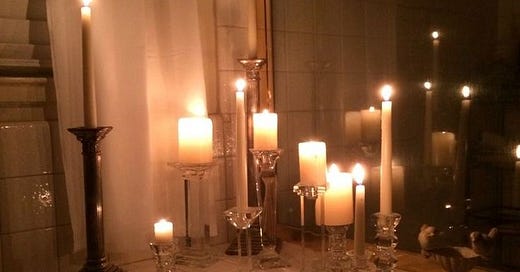


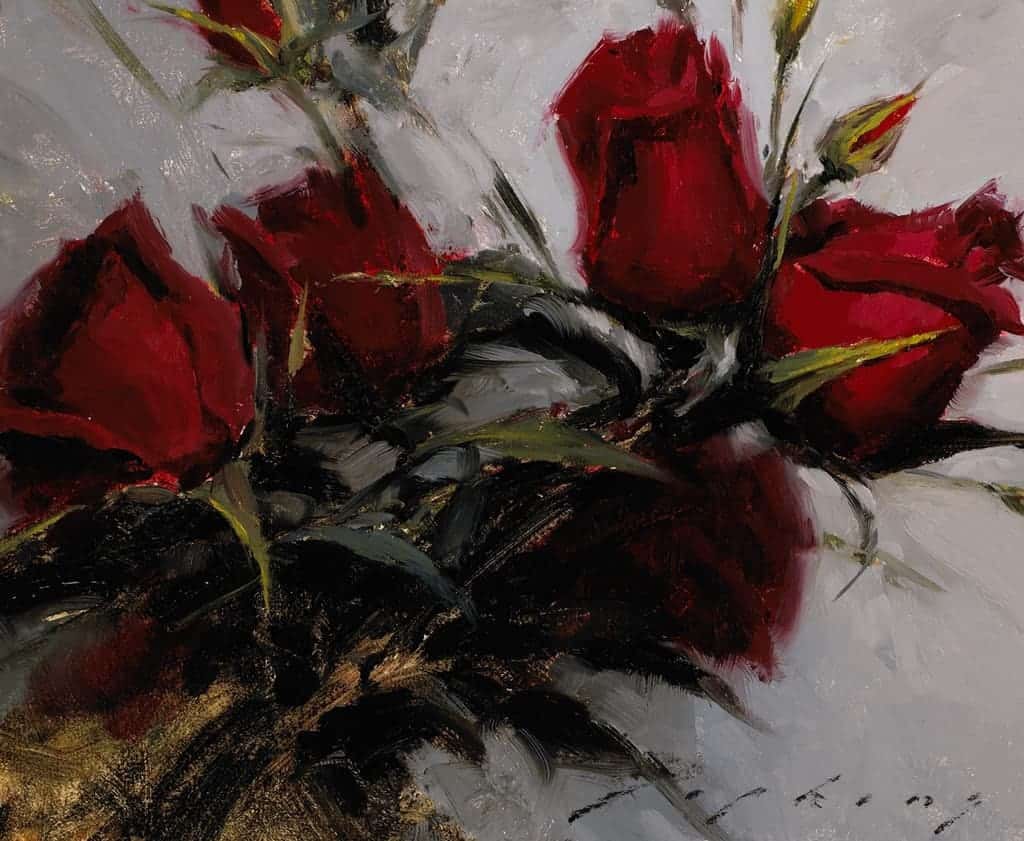

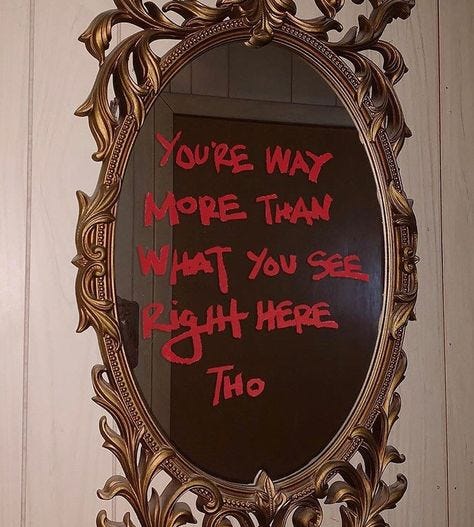

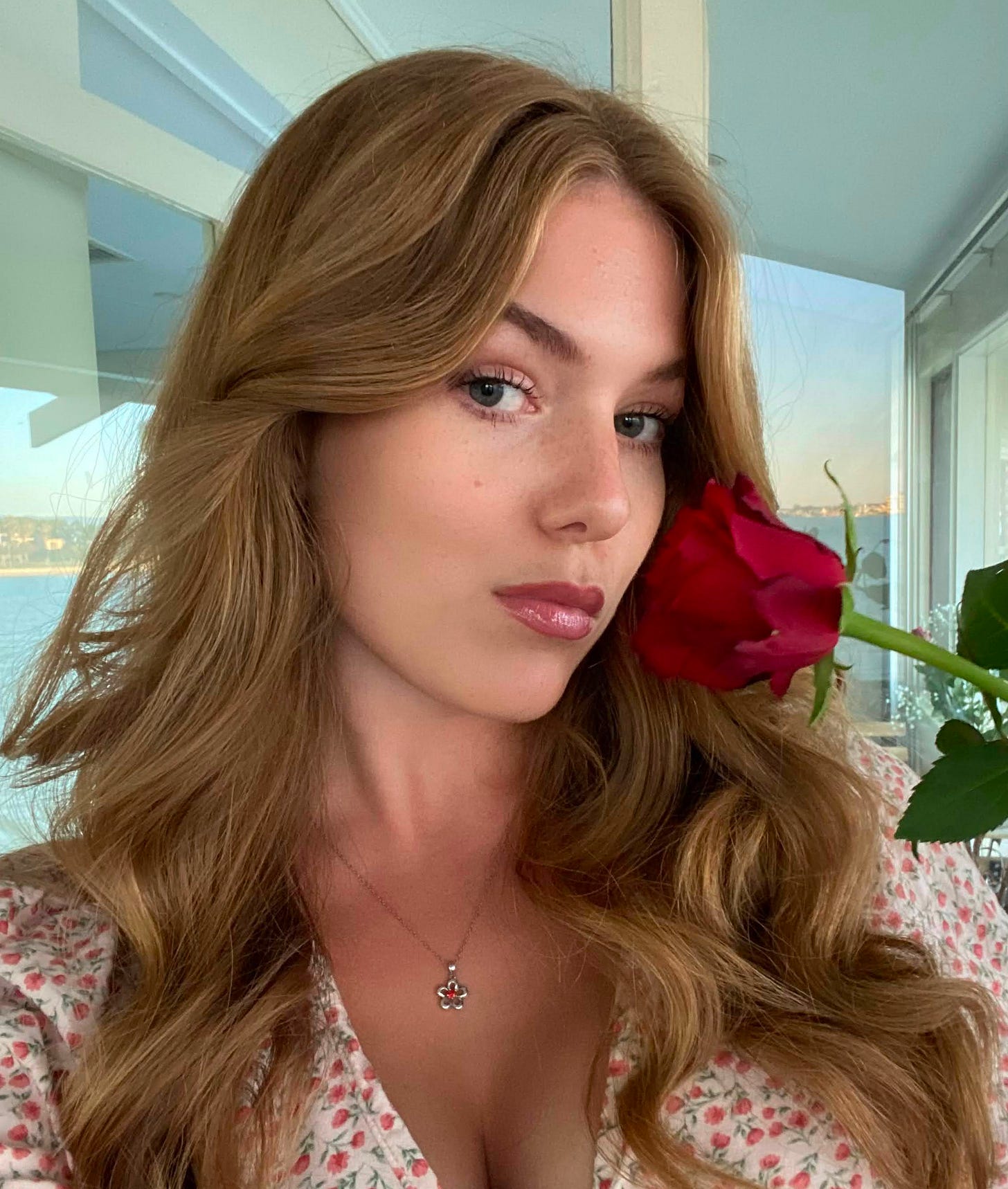

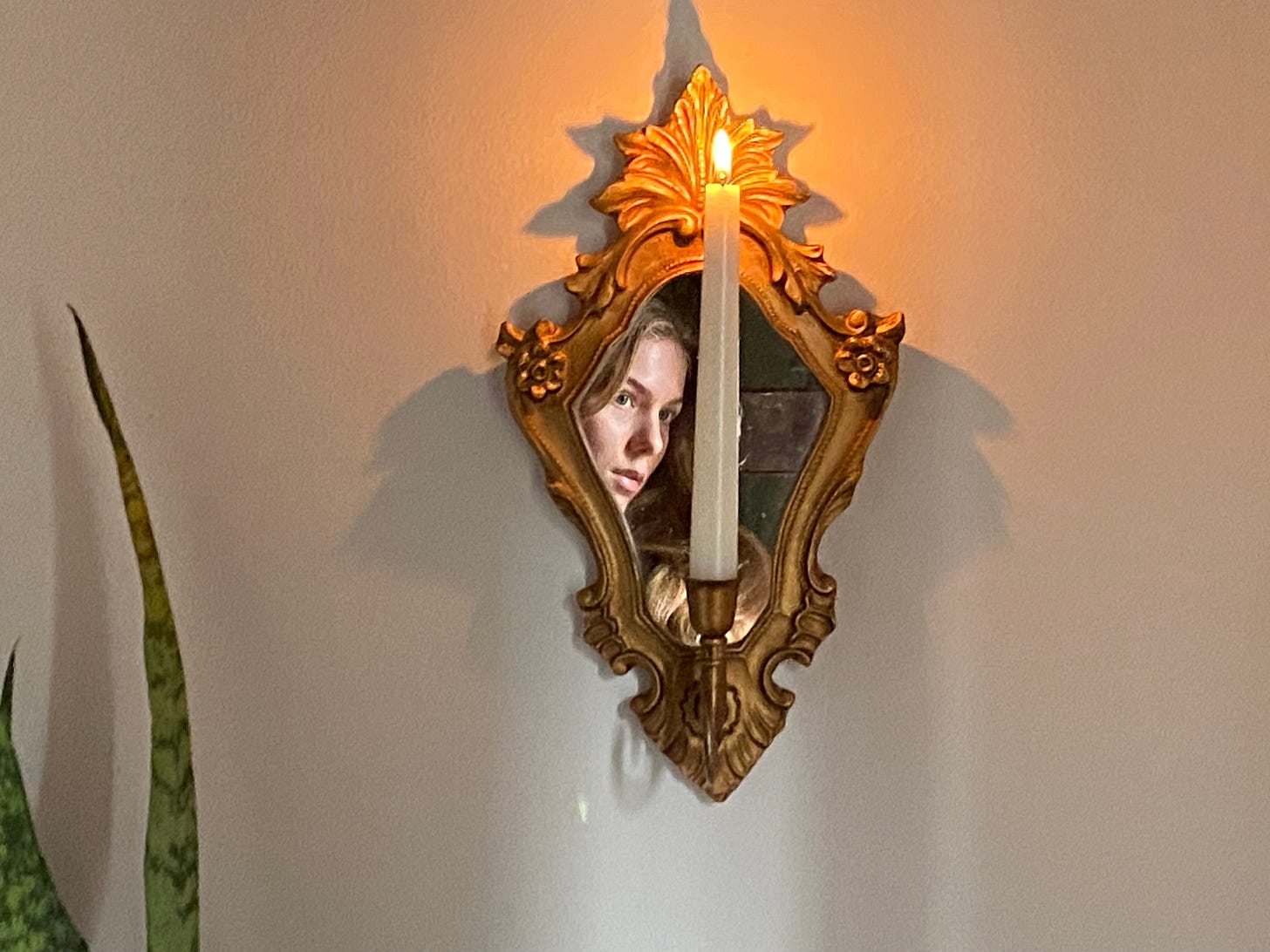
Oh my gosh, this is a great review! I also thought the mother/daughter reconciliation was so lovely!
your anecdotes are so intimate! I always love when writers weave them into their art<3